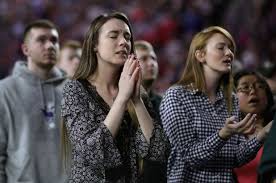Religion is an undeniably significant cultural factor across the globe, providing a worldview and lifestyle for billions of human beings on the planet. Although it has also absolutely been a source of strife and conflict in history, for many it also gives a sense of purpose, motivation for goodwill, and an ethical basis.
However, even within Christianity specifically, people tend to form divisions before they form unions, and the modern era shows evidence of a divide between so-called evangelical Christians and what can be considered the more mainline religious community. How the evangelical impact unfolds will undoubtedly have notable ripple effects across many sociopolitical sectors.
Political clout
Tuning in to any mainstream political talk show will inevitably eventually garner mention of “the religious right” or “evangelical conservatives.” Whether referring to the movement as a whole or certain American geographic designations where their ranks form the majority, modern political figures recognize that these evangelicals form a key block of voters that must be contended with in any election. Debate still rages as to whether politicians thus merely cater to or put on a false show to gain these votes, or whether some candidates truly represent the interests of the evangelical crowd, which, if true, would still be of concern to liberals, atheists, and others that have issues with their stances.
Biblical emphasis
Outside of the political arena and into the church, evangelicals tend to have rigid views on theology and doctrine. Whereas many Christians may have a loose interpretation of the Bible or believe its texts to be flexible or open to differing relative meaning per culture, as even significant figureheads such as Joel Osteen and Rob Bell purport, conservative evangelical Christians are more likely to insist that biblical scripture should be the defining point of beliefs, not the choice selections of those on speaking tours. The impact, then, is a fracture between those who seek to adhere to a biblical worldview and those who want their Christianity with more personal wiggle room.
Standard-bearer
As, by self-titled definition, “evangelical Christians” are the ones who feel a need to communicate their Gospel convictions to the rest of the world, they are going to tend to be the most vocal and visible of religious peoples, by virtue of their habits and callings.
 Since they have taken on this mission to go out and preach wherever they can, physically or digitally, they are naturally going to be the ones cited by media figures and encountered by everyday ordinary folks. Whether by intentionality or causality, the evangelicals are going to be the ones referred to as the default when talking about Christians and religion.
Since they have taken on this mission to go out and preach wherever they can, physically or digitally, they are naturally going to be the ones cited by media figures and encountered by everyday ordinary folks. Whether by intentionality or causality, the evangelicals are going to be the ones referred to as the default when talking about Christians and religion.
Opinions as to validity, strength, viability, and veracity of belief, religious or otherwise, is a powerfully personal, subjective matter. Evangelical Christians, non-evangelical Christians, other religious peoples, and non-religious peoples will all likely have strikingly opposing views on socially relevant topics. Amidst all the opinionated viewpoints, one thing is certain: The evangelicals are making a noteworthy impact on today’s religious community, for better or for worse.






